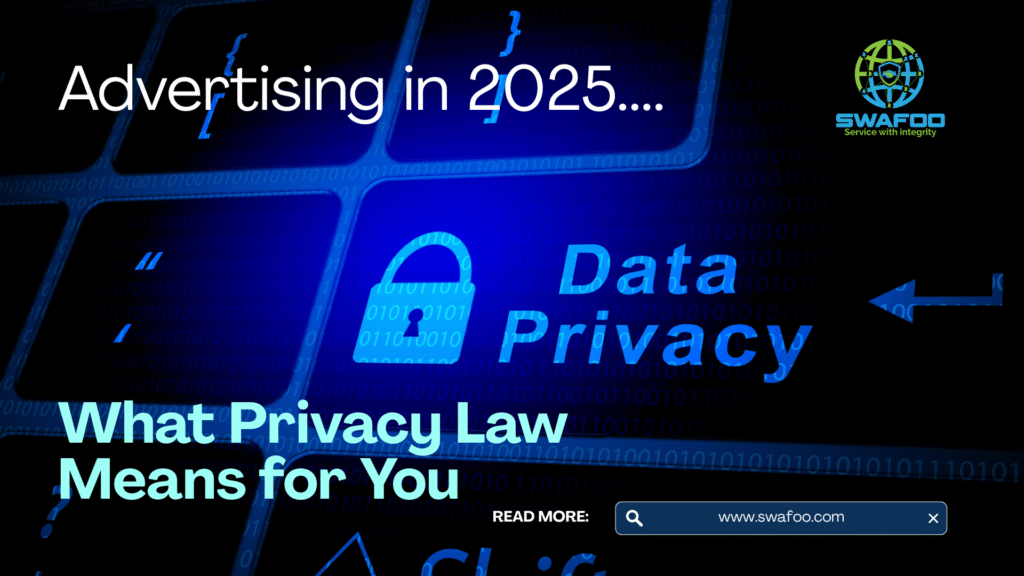
The Truth About SEO and Web Design: How Smart Design Can Improve Your Ranking
SEO and Web Design Every business wants to appear at the top of search engines. But few realize how closely web design and SEO work

Advertising in 2025.The privacy law landscape is evolving quickly, and 2025 is shaping up to be one of the most significant years for advertising regulation, legislation, and data protection. If you’re a marketer, advertiser, or business leader, you need to know how new laws, AI technologies, and trackers will impact consumer privacy, targeted advertising, and compliance obligations.
The world of advertising is transforming as privacy law reshapes how advertisers and marketers can interact with consumer data. In 2025, regulation is no longer just about cookies and trackers; it’s about comprehensive frameworks that touch every aspect of advertising, from data collection to AI-powered targeting.
One of the key shifts is the focus on consumer privacy. Regulators are emphasizing transparency in the use of personal data, and advertisers are expected to adopt mechanisms that clearly inform users of how their personal information is processed. This includes disclosures around targeted advertising, opt-out preference signals, and data protection rights like the right to access.
Another major development is the rise of AI in advertising. The use of AI has made it easier to automate targeting and signal processing, but it also raises questions about compliance with privacy law. Regulators in states like California, Maryland, Oregon, and Minnesota are introducing provisions to establish rules for AI-driven advertising, ensuring that consumers’ data privacy is safeguarded.
For marketers, the implication is clear: advertising strategies in 2025 must be built around compliance, transparency, and consumer trust. Violations will not only harm brand reputation but could also lead to enforcement actions and costly penalties.
Both state-level privacy laws and broader legislative frameworks define regulation in 2025. While a comprehensive federal privacy law is still under debate, state privacy laws have gone into effect across Delaware, New Hampshire, Tennessee, and beyond. These laws require advertisers to carefully assess their processing activities and implement privacy protection measures.
One standout is the California Consumer Privacy Act (CCPA), which continues to set the tone for data protection across the U.S. In 2024, amendments expanded provisions around opt-out preference signals, personal information use, and data access rights. By 2025, advertisers need to comply with new guidance issued by California’s regulator to avoid violations.
Other state laws, such as those in Maryland, Minnesota, and Oregon, establish frameworks that advertisers must adopt. These include obligations around health data, minor protections, and automated processing activities. The enforcement of these laws shows a clear shift toward more stringent privacy protection.
Global privacy frameworks, such as the GDPR, also influence U.S. regulatory developments. Although GDPR is a European framework, its comprehensive provisions for data protection and consumer rights have inspired U.S. states to adopt similar privacy regulations.
For advertisers and marketers, the challenge is navigating this patchwork of state laws and ensuring compliance across multiple jurisdictions. This requires a clear compliance program that can assess obligations, enact provisions, and establish frameworks that align with both U.S. and global privacy expectations.
AI is both a powerful tool and a regulatory challenge for advertisers in 2025. The use of AI allows marketers to automate advertising campaigns, target specific consumer segments, and process vast amounts of personal data. However, it also creates risks for consumer privacy.
AI’s ability to signal patterns in consumer behavior raises questions about transparency and data protection. Regulators are increasingly focused on ensuring that AI-driven targeted advertising does not cross the line into invasive data processing. Provisions in new legislation aim to establish clear rules for the use of AI in advertising, ensuring compliance with consumer privacy rights.
The use of AI in advertising also impacts consumer trust. Many consumers are becoming more aware of how their personal information is used, and they are demanding comprehensive privacy protections. Opt-out preference signals and mechanisms for consumers to limit AI-driven targeting are becoming mandatory under state privacy laws.
Marketers need to understand that while AI can enhance advertising efficiency, it must be used responsibly. Controllers of personal data are under an obligation to ensure that AI-driven processing activities are compliant with state laws, global privacy frameworks, and comprehensive privacy standards.
Consumer privacy is no longer an optional consideration; it is the foundation of advertising regulation in 2025. With new legislation emerging across multiple states, the obligation to protect consumer privacy is more stringent than ever.
One reason is the uptick in enforcement by regulators and attorneys general across the U.S. For example, provisions in New Hampshire and Delaware laws went into effect in 2024, requiring advertisers to establish compliance programs and outline their use of personal information. This momentum has carried into 2025, with even more states enacting privacy laws that prioritize consumer privacy and data protection.
Another reason is the rise of consumer awareness. Consumers now expect advertisers and marketers to comply with new legislation and protect their data. They are increasingly using opt-out preference signals and browsers designed to block trackers, reinforcing the need for advertisers to adopt privacy-friendly advertising strategies.
Finally, consumer privacy is shaping the future of targeted advertising. Advertisers who ignore privacy law risk losing consumer trust, facing regulatory penalties, and damaging their brand reputation. Those who embrace comprehensive privacy protections, however, can stand out as leaders in ethical and responsible advertising.
For marketers and advertisers, staying compliant in 2025 means keeping up with constant regulatory developments and adopting privacy-first strategies. Here are key things you need to know:
As we move into 2025, privacy law, advertising, regulation, and legislation are converging into a new era of consumer protection. For marketers and advertisers, the need to know is clear: embrace comprehensive privacy strategies, comply with new state laws, and prepare for a future where AI and data protection go hand in hand.
The most important things to remember are:
Marketers and advertisers who prioritize data protection will gain consumer trust and avoid costly violations.

SEO and Web Design Every business wants to appear at the top of search engines. But few realize how closely web design and SEO work

Marketing Strategies Creating digital marketing strategies that actually work isn’t about chasing trends or using every platform at once. It’s about focus, knowing what your